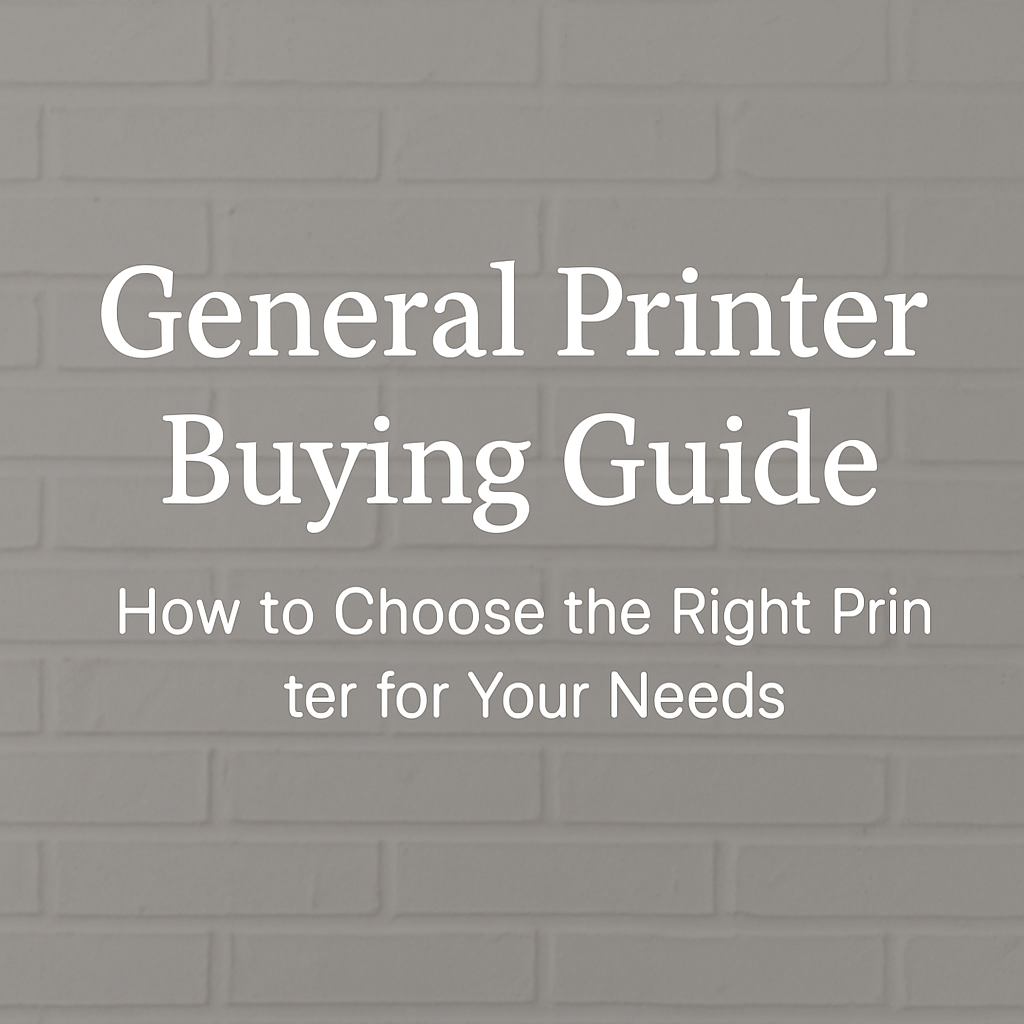
General Printer Buying Guide: How to Choose the Right Printer for Your Needs
Choosing a printer can be overwhelming with so many options on the market. Whether you need a device for home, office, or professional use, this guide will help you understand the key features and types of printers so you can make an informed decision.
1. Understand Your Printing Needs
Before diving into specifications, consider the following:
-
How often will you print? Daily, weekly, or rarely?
-
What will you print? Documents, photos, graphics, labels?
-
How much do you print? High-volume users should look for low cost-per-page options.
-
Do you need multifunction capabilities? (Print, scan, copy, fax)
2. Types of Printers
Inkjet Printers
-
Ideal for high-quality photo and colour printing.
-
Suitable for low to moderate print volumes.
-
Typically more affordable upfront but higher ink cost.
Laser Printers
-
Best for high-speed and high-volume black-and-white printing.
-
Lower running costs, especially for text-heavy documents.
-
Colour laser models are available but cost more.
Tank/Refillable Ink Printers (e.g., Canon MegaTank, Epson EcoTank)
-
Refillable ink tanks offer extremely low cost-per-page.
-
Ideal for frequent users.
-
Higher upfront cost, but economical in the long run.
Multifunction Printers (MFPs)
-
Combine printing, scanning, copying, and sometimes faxing.
-
Available in both inkjet and laser types.
-
Excellent for home offices or small businesses.
Photo Printers
-
Optimized for high-resolution photo prints.
-
Use special ink and photo paper.
-
Generally for photography enthusiasts or studios.
3. Key Features to Consider
-
Connectivity: USB, Wi-Fi, Ethernet, Bluetooth, and mobile printing (AirPrint, Google Cloud Print).
-
Print Speed (PPM): Pages per minute—important for high-volume users.
-
Print Resolution (DPI): Dots per inch—higher means better quality.
-
Duty Cycle: Maximum number of pages per month the printer can handle.
-
Paper Handling: Tray capacity, duplex printing, support for different paper sizes/types.
-
Operating System Compatibility: Ensure it's compatible with your device (Windows, macOS, etc.).
4. Running Costs
-
Ink or Toner Costs: Always check the price of consumables and page yields.
-
Maintenance: Some printers require regular cleaning or part replacements.
-
Power Consumption: Consider energy-efficient models if used extensively.
5. Brand and Support
Stick to reputable brands like HP, Canon, Epson, Brother, Lexmark, FujiFilm, etc. Check for:
-
Warranty
-
Availability of consumables
-
Service and support in your region
6. Budget and Long-Term Value
Balance the initial cost of the printer with ongoing operational costs. A cheaper printer might end up costing more in the long run due to expensive ink or toner.
7. Recommended Use Cases
| Use Case | Recommended Printer Type |
|---|---|
| Home Printing | Inkjet or Tank Printer |
| Small Office | Laser or MFP |
| Photo Printing | Dedicated Photo Printer |
| High Volume | Laser or Ink Tank Printer |
| Student Use | Compact Inkjet or Laser |
Final Thoughts
There is no one-size-fits-all printer. The best choice depends on your specific needs, budget, and printing habits. Taking time to assess your requirements and compare models can save you money and frustration in the long run.
Need help choosing a printer? Visit www.oztoner.au or contact our team for expert advice and exclusive deals.

